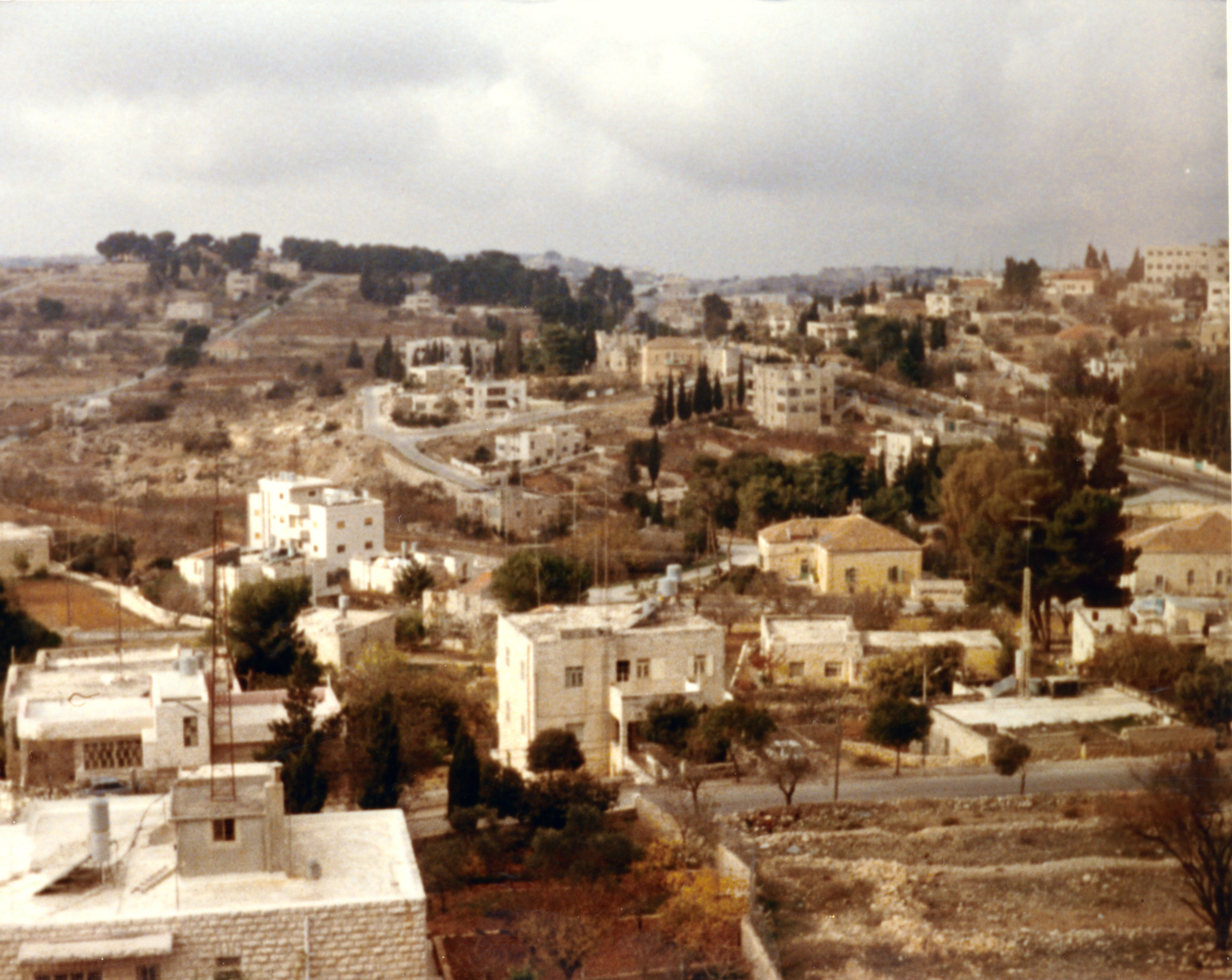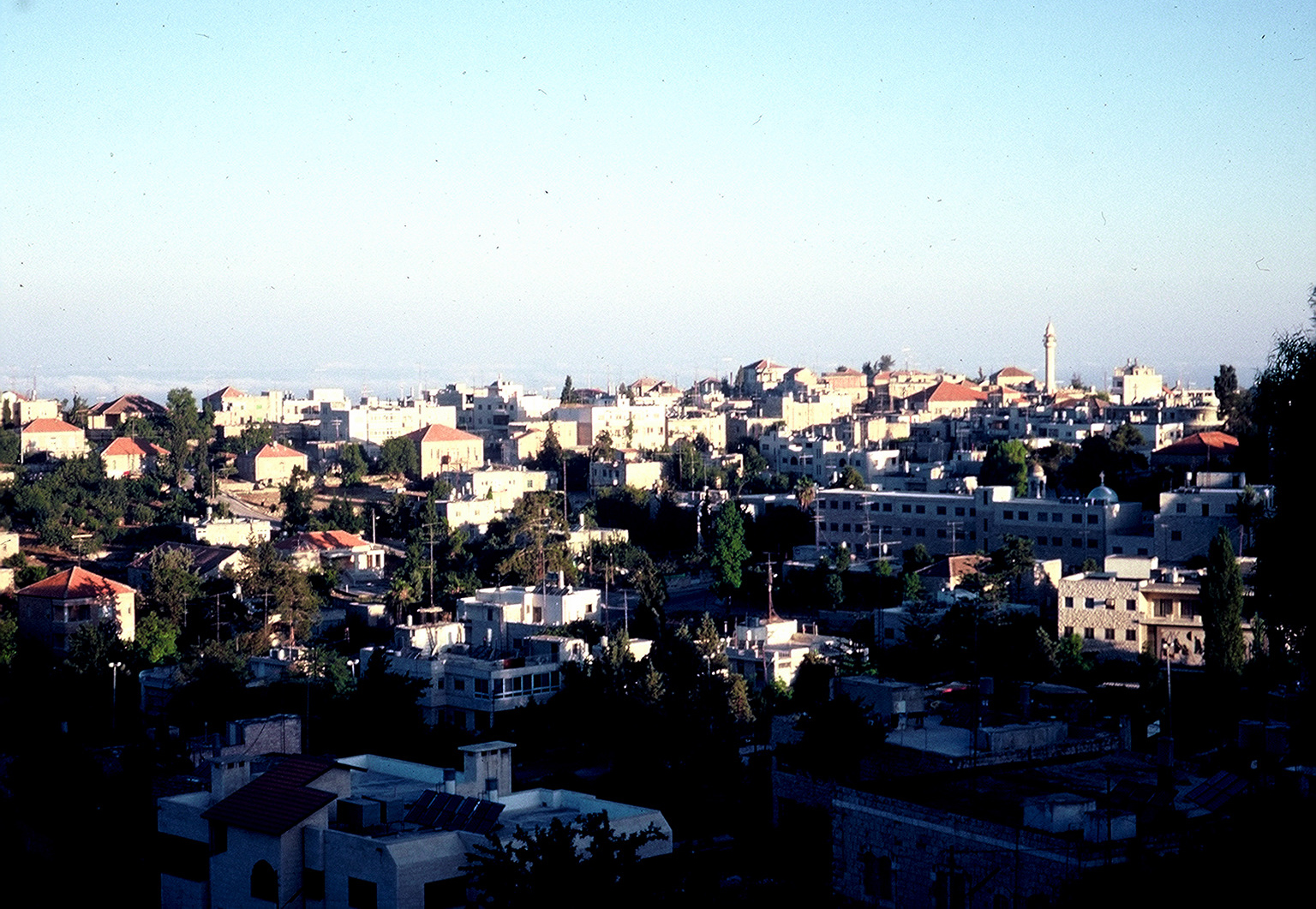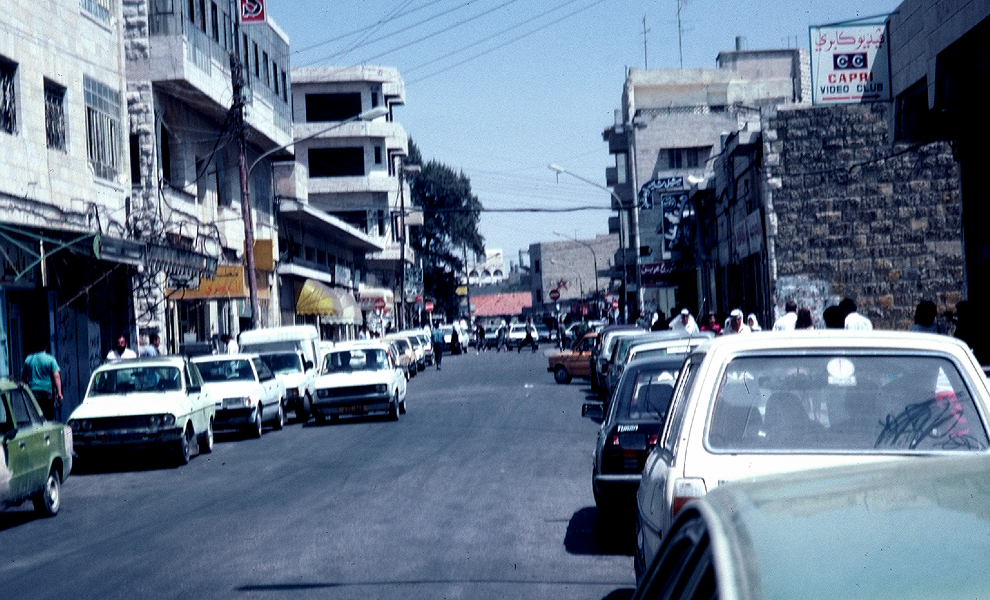September 1988
Echoes in the stairwell: footsteps ascend the limestone scales. Hagop stops at the third-floor landing, red-faced more than usual, white hair ruffled. Shirt button undone, he tugs at his collar. “Mistaken identity, they say.”
Another flight to his room. He grips the handrail tightly, knees shaken. Like last time, he couldn’t hear them coming. “That damn ear!”
The door creaks open. A sole bed peeks, then one desk and one chair, by the one window that overlooks Ramallah’s noisy town square. Its keys faded, and almost hidden by the stacks of music books towering on either side, stands the Bentley upright inherited from his father.
Hagop throws his tattered bag of scores on the bed. A face puffy and bruised stares at him from the mirror. Though his cheek bleeds, his pain is ancient. He pauses by his cherished piano, decked with black-and-white photos of people long gone. “Why play anymore?” He hesitates, then pops a well-worn tape into his cassette player and collapses into the chair, closing his eyes in reverie.
Beethoven’s piano sonata #8 in C minor, Pathetique.
Violent rising chords and falling arpeggios build a painful suspense, connected by melodic segments of sheer beauty, an idyll in a storm. Hagop can feel the constant tension of the first movement. An outside world impinging in rapid-fire unfinished cadences on an inner peace, almost inaudible.
“One ear!” He strains to listen, wondering how Beethoven must have felt–unable to hear the music he composed.
“Why am I still here?”
Teaching piano to mediocre students when everyone else is escaping a country in open rebellion? With the Intifada raging, he’s losing students too. The diligent practice they need is no match to the excitement of protests. Besides, with businesses on strike half the time, piano lessons have become a luxury.
Beethoven’s chords rage in quick succession from the puny speakers, then on to another gentle interlude.
Moisture wells in his eyes.
All of them mediocre, except for that one kid, that is. Amani, his youngest student. Only four when she started, she’s eight years old now. Hagop wasn’t sure about taking someone that young, but that girl had talent. What a joy to teach a child who shares the love of music, one who truly listens. How Hagop loves Wednesdays, when he hurries to her house, forgetting the usual preoccupations that dampen his walk.
From the cassette player, the notes bang like gunshots piercing the hum of the town square–reverberating bangs that end in silence. In a flash, streets erupt into battlegrounds, forcing him to scurry on his walks. He’s learned to duck into the nearest store or stairwell when bullets meet stones.
What future is there in this place for that child?

Ramallah 1980s
Another melodic interlude reminds him of the bird songs he misses. He can see them flit and open their throats, but their sounds drown in the din of the city and the incessant honks of automobiles. Their favorite perch on the power lines–five parallel wires, to him resembles a staff; and the birds, notes that move and shuffle as he walks along. He sometimes takes out a notebook to jot down their formations, seeking the divine melody they are writing for him.
The chords crescendo to a frenzy, to a certain Wednesday in June. He is hurrying to his star student’s house, barely paying attention to the bird formations, when a hand grabs his shoulder and turns him around, only so he can receive a punch in the face. A handful of Israeli soldiers surround him, wielding their batons. He must have not heard their order to stop. He covers his face with his forearms. The batons smash down on him, while one soldier holds him up by his crown of hair, like a marionette.
“Is this how it will end?”
The second movement’s soothing adagio brings him back to the present. Breathing, he opens his eyes to the faded black-and-white ‘fingers' beckoning his own. He fidgets as the hiss of the tape becomes oppressive during these soft measures. But he refrains. “Fingers too jittery,” remembering his decision not to play as he entered the room.
He plays his piano alone. No audience. Sometimes he dreams of sharing his music with someone, wishing another person is there to appreciate it, to listen, to enjoy. There is no one. Before the Intifada, he would play a daily game of backgammon with Garo at the café. Now the café is closed and Garo has moved to the safety of Jerusalem’s Armenian quarter. He considered doing the same, but his students, though dwindling in number, lived here in Ramallah. Besides, the Armenian Quarter felt claustrophobic. Like Russian dolls, a minority within a minority within a minority. Armenian Christian Palestinian, a sliver of the mostly Muslim and Jewish population. A mere shard of identity, like the tiny Armenian corner in the Church of the Holy Sepulchre, relegated a fragment of the tomb of Jesus, on the outside.
The soft lullaby turns his gaze above the piano, to the cross that his mother has embroidered in gold thread with arthritic fingers. It’s been years since he’s buried her, yet he can visualize her with melodic clarity. Her back stooped over her walking stick as she inched her steps forward, stopping to rest at the head of the sofa before attempting to sit. Her wrinkles, straight across her forehead, peeked beneath her scarf. How she suffered, her aches and migraines, and a million ailments. Years after he buried her, he could still feel her kindness and warmth lingering about him. Some things outlast death. Kindness. Love. Regrets. Guilt? Her dream was to see his children. Did he let her down? He could not find the right woman to marry. Well, there’s Lila, but …
“No. That is too painful.” His chair creaks.
The melody suddenly darkens. A stranger, he is often regarded, though he’s lived here all his life. His complexion sets him apart, almost albino burned red in the Palestinian sun. A white, Beethoven-like mane that he famously shakes while he plays the piano. His students even measure their progress by the intensity of his headbanging. He stands out in the crowd, and so does the music he teaches–classical Western music–unto children of a culture steeped in a more ancient musical tradition. His major and minor scales must sound like child’s play compared to the richness of the eighty-something scales and quarter notes of Arabic music. He plunges his old Bentley into battle when a neighbor switches on the radio to Umm Kulthoum or Abdelhalim. A battle he–with only major and minor scales–is ill-equipped to win.
To be sure, he has a stash of tapes for Umm Kalthoum and Abdelhalim, too. But his most beloved of the Arabic stars is Fairuz. He likes the proximity of her songs to the Western traditions, what with her composers’ Russian education. He would carry copies of her scores to give his students, hoping to interest them with those familiar songs that throw a bridge across the divide.
His heart gave a sudden squeeze as he glanced at his rifled bag of scoresheets.

Ramallah 1990s
He still is a stranger. At least that’s what the shabab thought an hour ago when they stopped him. Somehow missing the call for a strike day, he had gone on his normal Wednesday walk to Amani’s home. This time he was surrounded by a group of young men masked with kufiyahs. They weren’t from this neighborhood, and mistook Hagop for an Israeli–a settler perhaps, or an informer. His habitual mixing of the Arabic pronouns–mere vowels tagged to the end of the verb to denote the addressee–didn’t help. His students found it funny. These masked toughies were not amused. Fortunately, a neighbor heard the commotion and intervened before they went too far in roughing him up.
The speakers quiet to the sweet, soft chords again. He remembers a different childhood in Yafa–then nicknamed “the Bride of the Sea.” Car rides along wide avenues to the orchestra hall, where his grandfather sometimes played. His grandfather, dad, and uncles formed their own chamber ensemble, performing at weddings and special events for the city’s burgeoning intelligentsia. He practiced his piano lessons eagerly, dreaming to join them as soon as he was proficient enough.
The dark minors are never far apart in Beethoven’s pieces. Hagop’s dreams were extinguished before he could reach them. By the end of 1947, Yafa’s situation worsened. Weddings and performances came to a standstill as armed groups vied for the city’s future. A minority within a minority within a minority, his family decided to pack up while they still could, and seek the safety of Jerusalem’s Armenian quarter. Leaving everything behind, they only took their instruments. The grand piano, they sold for far below its worth.
The sudden entrance of the third movement startles Hagop. He cannot tell whether its mood is nearer the tense raw anger of the first movement, or the soothing sweetness of the second. The music rolls like a swirl of dancers at the Yafa music hall. He is 16, charming, standing coolly against the wall while his father and uncles churn the music. And then she comes swirling in front of him. Lila! He must ask her to dance. He scans the faces around the room–familiar from his frequent socials. None like hers! Nowhere is such grace in motion. The flower of the ‘Sea’s Bride’.
Toppling the chair, Hagop rushes to the bench. His fingers can no longer resist striking the keys. His fingertips awaken from the vibrations of the very sounds they’re creating.
Lila! Allegro.
The music spins out of control. His fingers falter.
He grew up on the stories of the trails–the Armenian trails of tears stretching out of Anatolia. His had been a leading musical family in Alexandretta in northern Syria when World War I erupted. An empire in decline, surrounded by industrialized powers at war, the Ottomans squeezed their minority populations. The Christians of Lebanon escaped to the sea, finding refuge on the shores of distant America. The Armenians bled. No safety on roads lined with bodies. His family headed south through Syria and Lebanon, to Palestine where they’d heard the British were coming. On the long trek they found shelter in the welcoming homes of Syrian Arabs, who helped them on their journey.
Eyes shut tight, his fingertips breathe voice into the Bentley. Acoustic tears intone his inheritance of exile.
Lila!
Two years of hurried secret meetings, and then …
His last youthful memory: he’s leaving Yafa, in a large car stacked with people and musical instruments. He glimpses her out the window. Yafa’s flower. The bride of a sea of orange blossoms. He glimpses her and unrolls the window as fast as he can to shout, as the car sped past her, …
It was the first time and the last time he told Lila he loved her.
Years later, Hagop still looks at the tiny photo she slipped into his hand, the night before at the rose garden, by the fountain, the birds shrieking from the terror of nightly raids. Oh how he searched for her, all over the West Bank. He scoured the refugee camps of Gaza. His last hope was extinguished in 1967 when reunited with Yafa. Lila’s home and his were demolished, as was his spirit. It was then that his ear faltered, the silence imposing on him.
Silence.
Suffocating silence.
Hair flying and forearms flailing, he crescendos in a gigantic piano scream.
Relentless frenzied arpeggios terminating in silence. Aren’t our lives like that?
A sonata that fades to aging ears.
Music composed in silence scratching with futility at a silence eternal?
Exile upon exile upon exile.
“Noooooooooo!” the old Bentley roars as Hagop pounds on the keys in fortississimo.
No more scattered exile. Here is home!
He will stay where he buried his mother.
He will stay – even
for one student.
And he will continue scratching against the silence.



